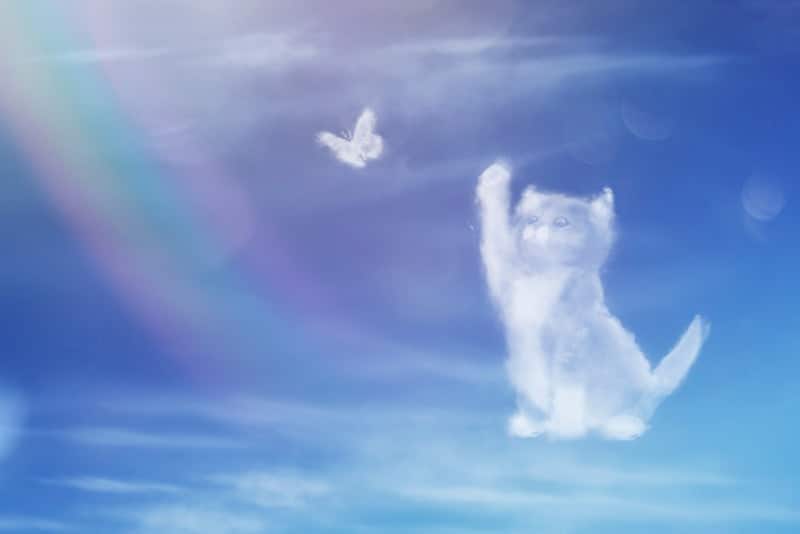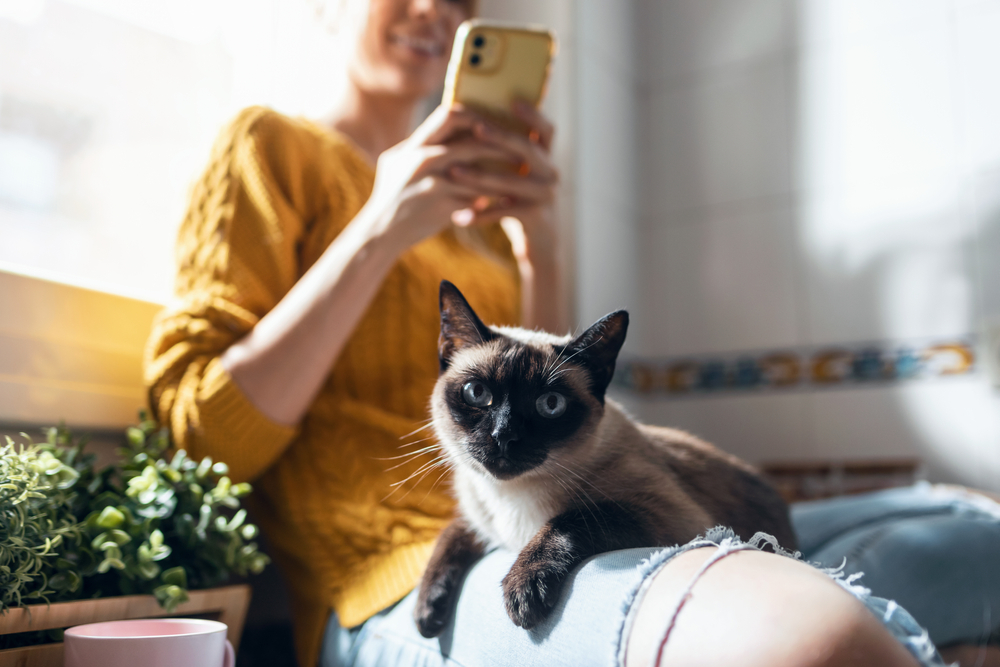If you’re a religious or spiritual cat owner, you probably believe that humans have souls, but things get fuzzier when it comes to our furry companions. Religions are often vague about whether animals have souls and precisely what a soul is, and it’s really down to your personal definition of what a soul entails.
What exactly is a soul? Is it an ineffable wellspring of identity, emotion, memory, and mental capacity? So, surely cats have souls in a similar way that we do, with their unique personalities, fears, loves, and so on.
If your definition of a soul is related to an immaterial divine force, it’s up to interpretation since science hasn’t discovered any hard evidence that souls exist. Broadly speaking, most religious doctrines regarding animals are more suggestions than hard dogma to be followed at all costs.
It’s hard to look into your cat’s beautifully expressive eyes and think there’s no light or soul behind them, but everyone has a different idea of what that means. Join us below as we get into what the major world religions say about cats having souls, whether they go to an afterlife, and more.
The Science on Cat Souls
As you might’ve guessed, the interpretation of a soul is something that’s rooted in one’s religion or spirituality. Science has, unfortunately, not explored this concept and has neither confirmed nor denied a soul’s existence.
However, there have been studies which have attempted to figure out if people believe that animals have souls. In one such study 1, the majority of the respondents felt that both cats and dogs have souls. Literature 2 suggests that the attitude toward animals saw a shift around the late 19th century.
Therefore, while the jury is out on whether or not your cat has a soul, it’s safe to assume that in today’s day and age, most people definitely think they do. It may be a part of the reason why as pets, animals play a crucial role in our emotional lives.
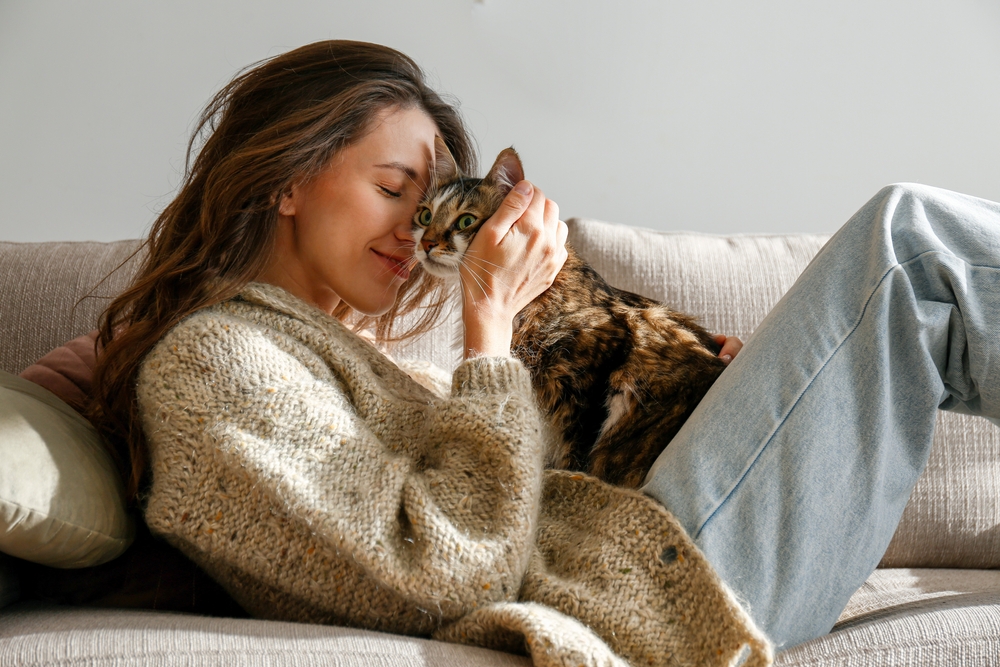
How Do the Major Religions Feel About Cats? Do They Have Souls?
Religions are often vague about whether animals have souls, and some attribute souls to animals while others don’t. Even within the strict confines of religious doctrine, there’s a lot of leeway in interpreting whether your cat has a soul, and unsurprisingly, most if not all spiritual pet parents believe their pets have a soul. Let’s see exactly what the major religions have to say, as well as a section on the cat’s place in ancient Egypt, where they were most revered.
Cats in Christianity
By the most literal interpretations, the official stance of Christianity on whether cats have souls is that they don’t. Humans are special in Christianity and the only beings blessed by God with a divine soul, while “lesser” animals like cats are here to provide us companionship.
Christians don’t believe that “going to heaven” happens automatically either. For a soul, entry into heaven is the result of conscious decisions made during one’s life. While the Bible is very specific about the requirements for human salvation, it says nothing about salvation for animals. This is interpreted by some as animals not having souls in Christianity.
More liberal interpretations admire cats and liken them to brave lions or emphasize their comforting presence while fully acknowledging that they have a soul. On an optimistic note, Pope Paul VI allegedly told a boy whose dog died that, “One day, we will see our animals again in the eternity of Christ. Paradise is open to all of God’s creatures.3
Cats in Judaism
There’s nothing that explicitly says cats have souls in Judaism, though some claim they possess a soul or divine spark like all living creatures. Cats are generally liked and associated with positive traits like contemplativeness, adaptability, and modesty.
According to the Talmud, cats have been kept by Jewish peoples since ancient times for their ability to hunt snakes and protect food stores. In general, Judaism has a far more charitable opinion on cats than dogs, which are considered savage and unclean. Multiple stories in both the Torah and Talmud closely associate dogs with demonic forces, so cats are definitely ahead in their book!
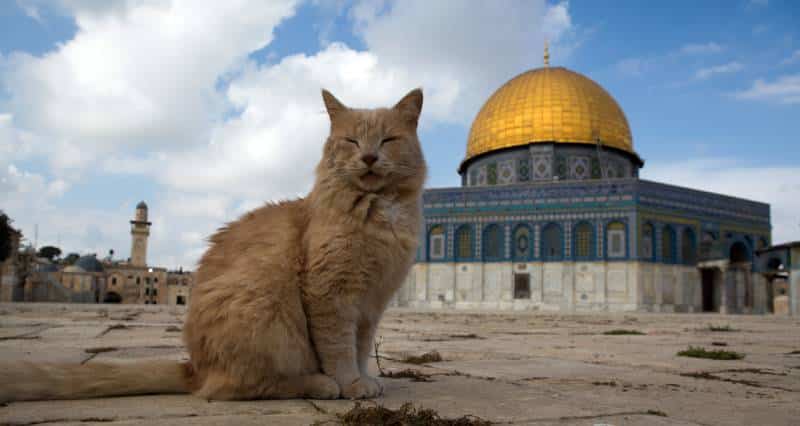
Cats in Hinduism
Hinduism doesn’t have any special love for the cat, revering creatures like the cow, elephant, dog, and crocodile instead. In fact, cats are often considered inauspicious in Hinduism and associated with undesirable traits, like aggression. Interpretations change, with some viewing the cat as a destroyer working for Shiva, the God of Destruction, and others simply seeing them as a lesser animal. While Hinduism respects all living creatures, cats probably aren’t on top of the list of animals they prefer as pets. We hope we’re wrong though!
Cats in Islam
Cats are holy creatures in Islam, with their prophet Muhammad supposedly having a favorite cat named Muezza. The story goes that Muhammad awoke one day for prayer with Muezza sleeping on the sleeve of his prayer robe, so Muhammad cut the sleeve off rather than disturb the cat’s slumber and went to pray. He then smiled and gently stroked the cat three times, which muslims believe gave cats the ability to land on their feet, also known as the righting reflex.
Today, cats are widely believed to be the most common pet in Muslim countries. They’re often seen in mosques and other holy places, where worshippers don’t mind their presence while they pray or perform religious activities.
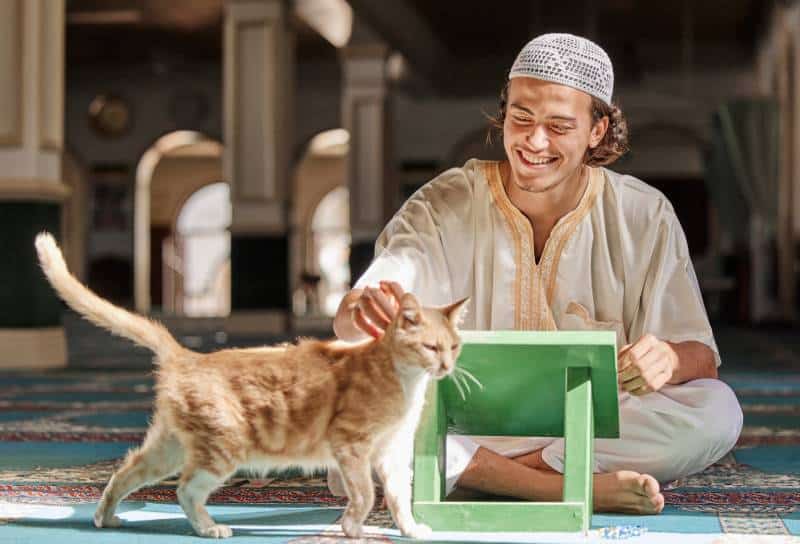
Cats in Buddhism
Cats are well-liked among Buddhists because they hunt pests that threaten food stores and are clean creatures. They’re considered mindful creatures, which is easy to see if you’ve ever stared into their thoughtful eyes. According to traditional folklore, at the highest level of enlightenment, a soul will reincarnate into a cat for their final life before ascending to nirvana. As a fun fact, the modern Birman cat breed is actually descended from cats originally bred by Buddhist monks in Southeast Asia!
Cats in Ancient Egypt
Most people know that cats were sacred animals in ancient Egypt, but really, they were the sacred animals. Cats were thought to be magical servants of the cat-headed goddess Bastet, associated with fertility, bravery, slyness, justice, and power across every realm of their religion. When they died, cats were sorrowfully mourned, bedecked in jewels, and mummified both alone and with prominent members of the Egyptian nobility.
To this day, there’s ample historical art depicting cats in all parts of Egyptian life, from hieroglyphs and amulets to sarcophagi—you get the picture. Cats were also mummified by ancient Egyptians and are widely depicted on hieroglyphs.
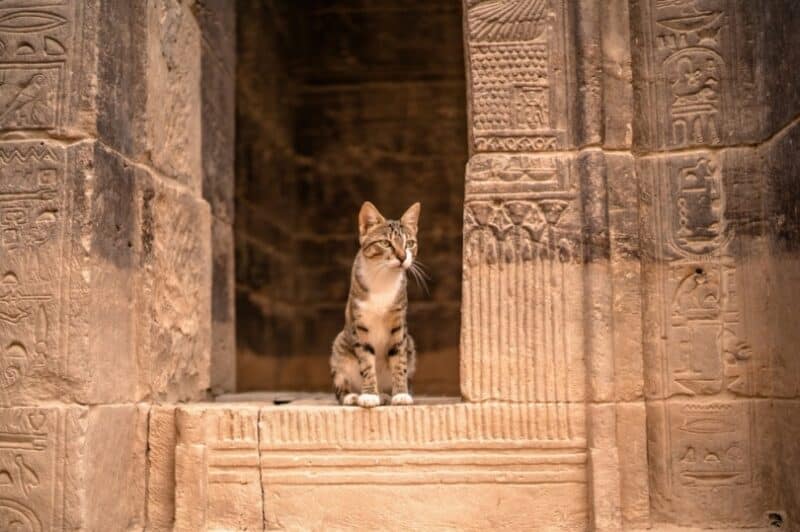
Final Thoughts
There’s no scientific evidence to suggest that souls exist, or that cats have them if they do, so it’s up to you to decide. Most religions have a positive view of cats, such as Judaism, Islam, and Buddhism, but sometimes they’re considered unlucky, like in Hinduism. Maybe more folks just need to own cats. If they did, they’d surely see that cats are just as worthy as humans of having a soul.
Featured Image Credit: Elena Nechiporenko, Shutterstock

